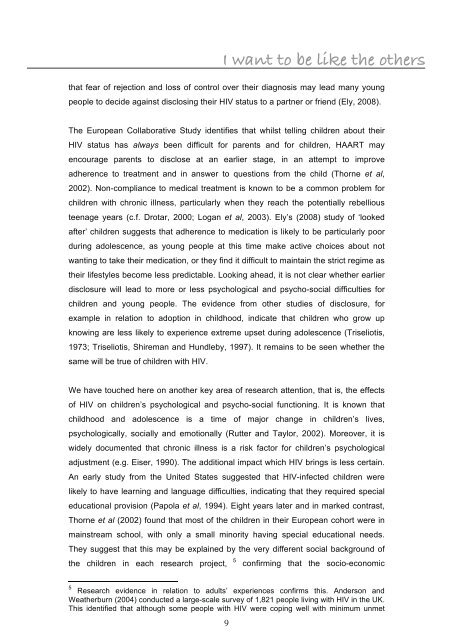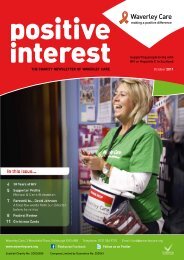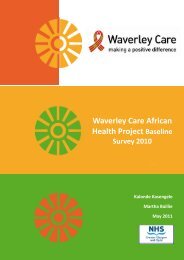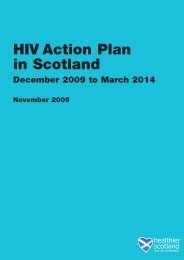I want to be like the others - Waverley Care
I want to be like the others - Waverley Care
I want to be like the others - Waverley Care
- No tags were found...
Create successful ePaper yourself
Turn your PDF publications into a flip-book with our unique Google optimized e-Paper software.
I <strong>want</strong> <strong>to</strong> <strong>be</strong> <strong>like</strong> <strong>the</strong> o<strong>the</strong>rsthat fear of rejection and loss of control over <strong>the</strong>ir diagnosis may lead many youngpeople <strong>to</strong> decide against disclosing <strong>the</strong>ir HIV status <strong>to</strong> a partner or friend (Ely, 2008).The European Collaborative Study identifies that whilst telling children about <strong>the</strong>irHIV status has always <strong>be</strong>en difficult for parents and for children, HAART mayencourage parents <strong>to</strong> disclose at an earlier stage, in an attempt <strong>to</strong> improveadherence <strong>to</strong> treatment and in answer <strong>to</strong> questions from <strong>the</strong> child (Thorne et al,2002). Non-compliance <strong>to</strong> medical treatment is known <strong>to</strong> <strong>be</strong> a common problem forchildren with chronic illness, particularly when <strong>the</strong>y reach <strong>the</strong> potentially re<strong>be</strong>lliousteenage years (c.f. Drotar, 2000; Logan et al, 2003). Ely’s (2008) study of ‘lookedafter’ children suggests that adherence <strong>to</strong> medication is <strong>like</strong>ly <strong>to</strong> <strong>be</strong> particularly poorduring adolescence, as young people at this time make active choices about not<strong>want</strong>ing <strong>to</strong> take <strong>the</strong>ir medication, or <strong>the</strong>y find it difficult <strong>to</strong> maintain <strong>the</strong> strict regime as<strong>the</strong>ir lifestyles <strong>be</strong>come less predictable. Looking ahead, it is not clear whe<strong>the</strong>r earlierdisclosure will lead <strong>to</strong> more or less psychological and psycho-social difficulties forchildren and young people. The evidence from o<strong>the</strong>r studies of disclosure, forexample in relation <strong>to</strong> adoption in childhood, indicate that children who grow upknowing are less <strong>like</strong>ly <strong>to</strong> experience extreme upset during adolescence (Triseliotis,1973; Triseliotis, Shireman and Hundleby, 1997). It remains <strong>to</strong> <strong>be</strong> seen whe<strong>the</strong>r <strong>the</strong>same will <strong>be</strong> true of children with HIV.We have <strong>to</strong>uched here on ano<strong>the</strong>r key area of research attention, that is, <strong>the</strong> effectsof HIV on children’s psychological and psycho-social functioning. It is known thatchildhood and adolescence is a time of major change in children’s lives,psychologically, socially and emotionally (Rutter and Taylor, 2002). Moreover, it iswidely documented that chronic illness is a risk fac<strong>to</strong>r for children’s psychologicaladjustment (e.g. Eiser, 1990). The additional impact which HIV brings is less certain.An early study from <strong>the</strong> United States suggested that HIV-infected children were<strong>like</strong>ly <strong>to</strong> have learning and language difficulties, indicating that <strong>the</strong>y required specialeducational provision (Papola et al, 1994). Eight years later and in marked contrast,Thorne et al (2002) found that most of <strong>the</strong> children in <strong>the</strong>ir European cohort were inmainstream school, with only a small minority having special educational needs.They suggest that this may <strong>be</strong> explained by <strong>the</strong> very different social background of<strong>the</strong> children in each research project,5confirming that <strong>the</strong> socio-economic5 Research evidence in relation <strong>to</strong> adults’ experiences confirms this. Anderson andWea<strong>the</strong>rburn (2004) conducted a large-scale survey of 1,821 people living with HIV in <strong>the</strong> UK.This identified that although some people with HIV were coping well with minimum unmet99











